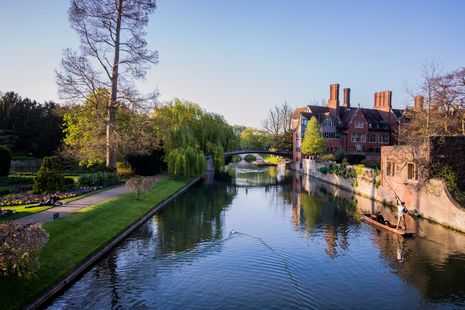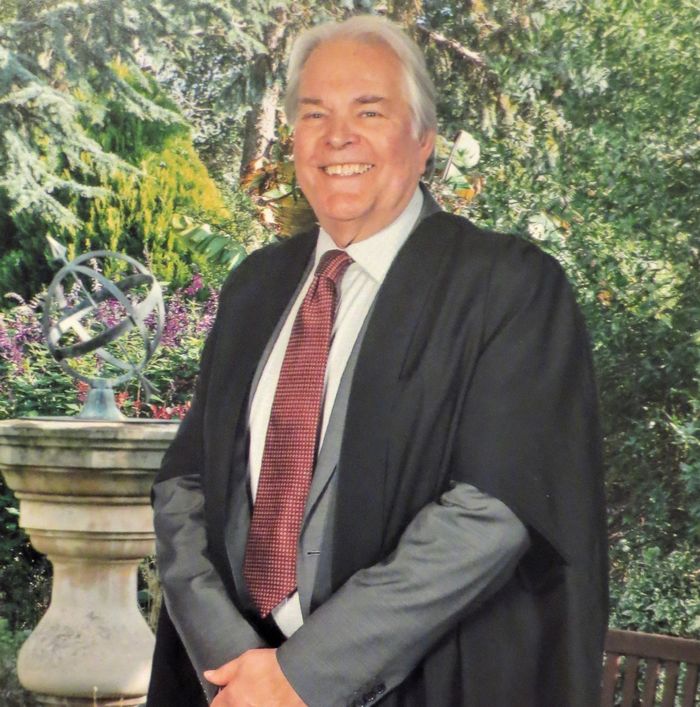Landscapes of the mind
Sean O’Hare explores how the sights and stories of Cambridge have shaped his imagination

My younger years in Upstate New York were outdoors and always on the move. I can see the landscape when I close my eyes. Games in the field across the street, long walks in the woods beyond the field, canoe trips on the river with brothers or friends. My imagination grew with the ground I covered, took its shape from the trees and rolling hills that rose away behind the riverbank. The land seeped into me as I passed through it, my eager thoughts awash with the places I discovered. Often, on warm summer nights, I’d stand at the edge of a nearby field entranced by some lightning storm off in the distance. There I’d watch the streaks of light play against the billowing mountains in the sky, rippling fire telling the tale of some dreadful, half-hidden battle.
Now I’ve wandered further afield, living here in Cambridge and reading the old classics of English literature for the first time. And as I settle into my new life, these strange circumstances have forced me into a different kind of integration: I’ve spent more time outdoors than I would have otherwise. The past few terms, these spells outside have come as a welcome break from my work. Yet I’ve often spent my time walking the streets in reflection on what I’m reading or mentally sketching an essay. And as I do, I’ve become increasingly aware of the ways those texts are tied to Cambridge, how a deeper connection to them comes not only from the page but from the city’s winding streets.
“My imagination grew with the ground I covered, took its shape from the trees and rolling hills that rose away behind the riverbank”
I like to think that, as I wander this city, beating new paths or following what have become my “old” favorites, that I’m not just skirting the top of the landscape – that instead, I’m sinking down into it, that something of the old buildings and trees and flowing river is getting inside me as well. And as I come to these texts for the first time, my thoughts are taking the shape of this landscape. I find evidence of this when I walk over the same spots again, memories of ideas, books or feelings waiting for me in the locations I left them. The Senate House Passage, for me, is distinctly Ovidian. I can recall a cold night before Christmas last year, after a marathon reading of Metamorphoses, wandering down the stone passage, enclosed in lingering tales and the towering buildings – emerging before I knew it out onto King’s Parade and resurfacing from the poem. Now when I pass through, bits of the poem often appear in my mind unbidden; when I’m elsewhere and think of the poem I’m there in the passage again.
I’m far from the first to inhabit the poem in this place. Previous generations of scholars and writers have walked down that same passage perhaps, caught up in their own reflections on the poem, captivated by its deep psychological insights and wrestling with its strange tales of shifting forms. To read it in this city is to overhear the conversation that has been unfolding around it in places like that passage, to catch echoes of great literary minds attempting to understand and build upon it: poets like Edmund Spenser, reading Ovid himself for the first time here in Cambridge, weaving its many tales and themes into his own Faerie Queene years later. In recent weeks I read Spenser’s epic poem in my own room, a five-minute walk from where he read Ovid in his. Taking a break from the Faerie Queene I would wander outside, often passing Pembroke College, picturing him somewhere within some five hundred years ago, hunched over a copy of Metamorphoses. I would wonder how that same street I paced outside his college had moulded his own reading of Ovid, how years later, impressions from the old Latin poem had changed shape into his mystifying, towering allegory of knights and Christian virtues that I was roaming through.
“And as I come to these texts for the first time, my thoughts are taking the shape of this landscape”
While my walks alone are always good, far better are the rambling excursions with my housemates. Sometimes we go together in a group, but often I set out with a coursemate also in his first year. He and I wander for hours on the weekend. So far, we’ve covered what feels like every conceivable inch of the city, wonderfully lost in dozens of books and writers, poems remembered and shared, debates on religion or philosophy. And like my own internal thoughts, when we return to these places we find remnants of the words that happened there, residual signs of insights shared on previous days. We often discover our course readings out on the streets as well. One day, after a week of Paradise Lost we passed Christ’s College, pausing for a moment to look up at its gate, imagining Milton somewhere inside nearly four hundred years ago. Milton undoubtedly had read Spenser and Ovid here, Spenser had read Ovid a few streets over – and we had read all of them in this city we were exploring now, their words swirling around us.
Not all these resonances are quite so old. Some have been made and left for us in more recent years. A few weeks ago, on a bright spring day, we walked to Grantchester. The gate to The Orchard was open and we passed in along the path between the lawn and the trees. There was a display with pictures of the Grantchester Group, excerpts from letters and journals telling the tale of their time there. A note from Bertrand Russell struck me: it told of walking all the paths around Cambridge so much that he knew them by heart, of wandering the city and the surrounding countryside with his friends for hours on end. I felt encouraged in what had merely been an instinct before, but was now confirmed for me as a time-honored tradition. I wondered how many times that day in Grantchester our path had crossed his own, or Virginia Woolf or Rupert Brooke’s. On the way home I strained to hear their laughter, to catch faint echoes as they shared their work or some novel idea.
Today, passing Great St. Mary’s on one of my solitary walks, I thought of the landscapes of my childhood again. All at once, my wandering here, in this city, made sense; just as those fields, skies and rivers helped form me as a child, the sights and stories of Cambridge have shaped my new literary imagination. I rushed back to write it all down, to tell of my walking and thinking on these streets. I wrote in my head as I hurried home, catching words along the way, arranging my thoughts into points and paragraphs. I made my way here, back to my street, into my college, through the staircase door and up into my room where I write now. As I sit at my desk, recalling spoken words that linger like landmarks, books and poems soaked into the stones of old colleges and caught in branches over well-worn paths, I close my eyes and see the city in my mind.
 News / Right-wing billionaire Peter Thiel gives ‘antichrist’ lecture in Cambridge6 February 2026
News / Right-wing billionaire Peter Thiel gives ‘antichrist’ lecture in Cambridge6 February 2026 Features / From fresher to finalist: how have you evolved at Cambridge?10 February 2026
Features / From fresher to finalist: how have you evolved at Cambridge?10 February 2026 Film & TV / Remembering Rob Reiner 11 February 2026
Film & TV / Remembering Rob Reiner 11 February 2026 News / Churchill plans for new Archives Centre building10 February 2026
News / Churchill plans for new Archives Centre building10 February 2026 News / Epstein contacted Cambridge academics about research funding6 February 2026
News / Epstein contacted Cambridge academics about research funding6 February 2026










